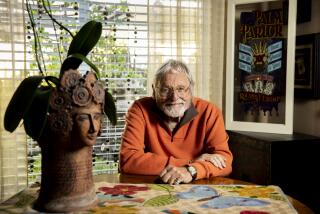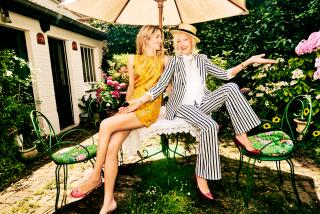Renie Bardeau, photographer who captured Disneyland’s early evolution, dies
- Share via
It was 1976 and Kim Petersen found herself on the fringe as several photographers prepared to shoot Disneyland’s bicentennial-themed parade. It was the 16-year-old high school senior’s first media assignment, and she was excited.
Petersen stood out in the crowd with her basic camera gear, compared with other photographers’ fancy equipment. She believes that’s how Renie Bardeau, Disneyland’s chief photographer, noticed her.
Before the parade began, Bardeau walked over to her, introduced himself and moved her to stand between two other men who had most likely been photographers longer than she’d been alive. Bardeau placed her at a better vantage point, perfect for a long shot of the parade, Petersen recalled.
“I never forgot this simple courtesy extended to a measly little high schooler,” Petersen said.
Bardeau was a revered photographer credited with documenting Disneyland’s every nook and cranny, archiving the amusement park’s evolution for nearly four decades beginning in 1959. He was a mentor to many and a Disneyland celebrity to diehard Disney fans, some of whom own an autographed copy of his famed “Footsteps,” a candid black-and-white photo of Walt Disney walking in front of Sleeping Beauty Castle in 1964.
Bardeau died Jan. 4 of kidney failure at his retirement home in Glendale, Ariz., having contracted COVID-19, according to his daughter Debbie Bardeau. He was 86.
“He left a photographic history that will endure,” she said. “He loved his Disney family and leaves behind an amazing legacy.”
Bardeau started his photography career when he was 12. The native Arizonan earned a Boy Scout merit badge for his work and later took photos for his high school yearbook and campus newspaper. He joined the Navy after high school and became an aviation photographer aboard the aircraft carrier Midway during the close of the Korean War.
He later enrolled in college, intending to pursue a career in advertising. To earn money between semesters, he took a photography summer job at Disneyland because the now-defunct Los Angeles Herald Examiner — his preferred destination — didn’t have internships available.
That 1959 part-time summer gig marked the beginning of his legacy.
Bardeau’s first assignment was covering the opening of Tomorrowland, which included getting a photo of the ribbon-cutting at the monorail with then-Vice President Richard Nixon, his family and Walt Disney.
In 1964, Bardeau graduated from college and Disneyland offered him a full-time position, which he accepted. He moved with his family from Tucson to Anaheim, minutes away from the park. He became chief photographer in 1968.
He went on to photograph foreign dignitaries such as Emperor Hirohito of Japan; actors such as Elizabeth Taylor; big band musicians such as Buddy Rich and members of the Glenn Miller Orchestra; and Disney himself.
His most memorable photo is likely a shot of Disney on a firetruck with Mickey Mouse in front of Sleeping Beauty Castle. That photo was shot on a Rolleiflex, which yielded only 12 pictures per roll. He took 11 pictures of Disney at different angles and thanked him for his time.
“[Disney] asks me if I was sure, and I told him I was. He then told me that at the studio we treat film like paper clips. You shoot, shoot, shoot all the film you need because if it’s not in the can, you will never have it. So he asked me to shoot one more. ... So, I shot one more, and he said, ‘That’s fine, thank you, Renie,’ and he walked away,” Bardeau told The Times in 1987.
He didn’t remember if the 12th frame was the shot selected, but the picture was used for years. He described it as “trademark” photo.
“I think the one thing about my dad’s photographs is he was always able to capture emotion and story,” his daughter Debbie said. “You can look at a photo and see what he was trying to portray. It didn’t take a lot of explanation. I think that was just a gift he had.”
A year after he retired in 1998, Bardeau received the highest honor given to Disneyland employees. His name was immortalized on an upper-story Main Street window — above a camera shop. The marker reads “Kingdom Photo Services. Magic Eye to the World. Renie Bardeau. Photographer-Archivist.”
In a statement, the Disneyland Resort said, “We are deeply saddened to hear of the passing of Renie Bardeau, who will long be remembered for some of the most iconic Disneyland photography ever published.”
Among colleagues, Bardeau was known for his gregarious personality and off-color humor. He always wore a suit and regularly wore a Disney-themed tie. He constantly roamed the park, carrying his camera with his signature Mickey Mouse strap around his neck. Despite his rising fame, he was a mentor for photographers and employees across departments.
“His personality shined. Everybody liked him. He never had a bad word for anyone,” former photographer colleague Gary Moore said.
Moore said Bardeau was the first to welcome him to the team on his first day of work in 1959. The two quickly hit it off and spent a majority of the day lollygagging at the backstage cafeteria. They regularly teamed up to shoot and were sent to Florida to document preparations before the grand opening of Walt Disney World.
“He never acted superior. He was there to cooperate and make it the best photo and make it exactly what Walt wanted,” former colleague Peggy Matthews Rose said.
She met Bardeau in the late 1960s when he took her photo as Peter Pan. They later worked together behind the scenes for the Disneyland Resort Line, an internal magazine. He taught her how to set up photos, what to look out for and, eventually, helped her choose her first camera.
In the late 1970s, she said Bardeau suffered a stroke that affected his speech, but he kept plugging along and fully recovered.
He embodied “sticktoitivity,” she said, a phrase Disney coined to describe perseverance.
Bardeau is survived by his daughter, son, stepson, four grandchildren and two great-grandchildren.
More to Read
Start your day right
Sign up for Essential California for the L.A. Times biggest news, features and recommendations in your inbox six days a week.
You may occasionally receive promotional content from the Los Angeles Times.







